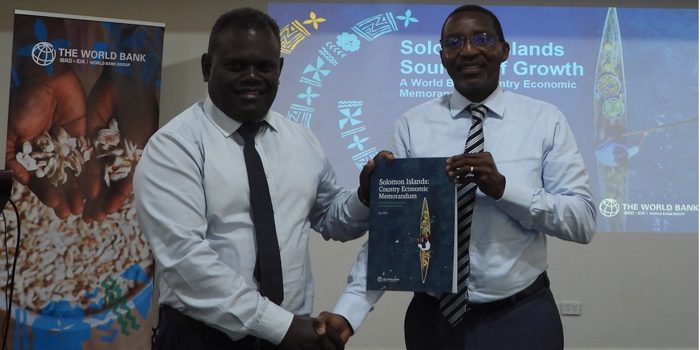A WORLD Bank report recommends that Solomon Islands Government invest in post-harvest facilities to strengthen the fishery industry.
The report also advocates for better information dissemination and the development of adaptive management systems.
The report, titled Solomon Islands: Country Economic Memorandum – Unlocking New Sources of Economic Growth, examines the key barriers to sustainable economic development, focusing on challenges related to economic geography and private sector development.
Conducted between February 2023 and March 2024, the Country Economic Memorandum (CEM) analyzes constraints in high-growth sectors, including agriculture, fisheries, tourism and labor mobility.
It provides actionable policy recommendations to overcome these challenges and unlock new sources of growth.
Currently, Solomon Islands has only one tuna cannery, located in Noro, Western Province.
However, with support from international donors such as New Zealand, Australia and the World Bank, the Bina Harbor Processing Plant Project in Malaita Province is progressing well towards construction.
The World Bank report emphasizes the need for investments to address post-harvest challenges, along with improving connectivity, information dissemination, and port and freight handling infrastructure.
It states, “For instance, a robust and efficient cold chain that eliminates spoilage could generate a 1.1 percent GDP growth dividend by 2028. Investments and pilots must be based on detailed pre-feasibility studies and assessments of existing capabilities.”
The report also cautions that any push towards commercialization should not undermine subsistence needs. It highlights the potential of ICT in resource management, noting that “Better information dissemination can benefit fishers by expanding extension services, sharing critical market intelligence, and providing opportunities for information exchanges, training, mentoring and collaboration.”
An example of this approach is the mobile phone technology being used by fishing communities and vendors in the Solomon Islands to manage fish stocks.
According to the Coral Triangle Initiative (CTI), the Hapi Fis, Hapi Pipol! (Happy Fish, Happy People!) mobile app, funded by USAID, has helped develop a real-time database for the government.
This project was recently named a Grand Prize winner in the United States Agency for International Development (USAID) Science and Technology Pioneers Prize contest, recognizing its innovation in solving development challenges.
The app allows officials from the Ministry of Fisheries and Marine Resources to capture information from fishers and vendors about major fish markets and landing stations.
The data is transmitted to a cloud-based virtual server, where it is automatically analyzed to inform fisheries management and resource protection efforts. Without such centralized data, effective fisheries management had previously been difficult in the geographically dispersed Solomon Islands.
Additionally, the World Bank report stresses the importance of early warning systems to address climate-related challenges and resource depletion.
In Solomon Islands, the Meteorological Services (SIMS) oversees three key phases of the Early Warning System:
1. Monitoring of precursors;
2. Forecasting probable events, and
3. Issuing warnings or alerts in case of catastrophic events.
While SIMS monitors and issues warnings through its network of weather stations across the country, it is not responsible for initiating response activities. SIMS collects data on climate, soil, air, and ocean conditions, including temperature, rainfall, and wind speed, to track environmental trends.
The report also highlights the opportunity for small-scale fisheries to link with urban markets, contributing to sustainable and inclusive growth while enhancing food security.
Given the Solomon Islands location in the fertile Western and Central Pacific Ocean, which holds the largest tuna fisheries globally, the country is well-positioned to derive additional revenue from fishing access sales and expanded onshore tuna processing.
To stimulate growth in the fisheries sector, the report concludes that an approach addressing both producer constraints and environmental challenges is essential.
By EDDIE OSIFELO
Solomon Star, Honiara









